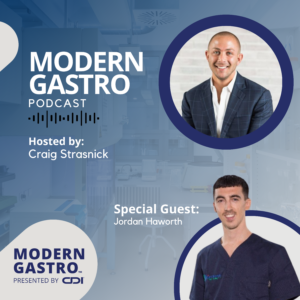The Journey into GI Physiology: Understanding Gut Health and the Power of Scientifically Validated Testing with Jordan Haworth
For many healthcare professionals, the path to their specialty is often a straight line from early interest to years of training. But for Jordan Haworth, a leading GI physiologist, his journey into gastrointestinal (GI) physiology was anything but planned. Originally drawn to the cutting-edge field of immunotherapy and cancer treatment, Jordan found himself pivoting towards gut health after missing out on a spot in immunology. Little did he know, this shift would lead him to a specialty that is not only vital to overall health but is also growing in importance in the medical world.
A Fortunate Shift to Gut Health
Jordan’s introduction to GI physiology came through a job opportunity under Professor Anthony Hobson, a clinical director whom he greatly admired. The role involved a three-year training scheme, and while Jordan initially saw it as a stepping stone, his fascination with gut health quickly deepened. As he learned more about how the gut microbiome—a diverse collection of bacteria living in the digestive tract—affects everything from digestion to mental health, he realized the far-reaching implications of gut health on overall well-being.
The Gut Microbiome: More Than Just Digestion
The gut microbiome’s influence extends well beyond digestive health. One study even demonstrated that altering the gut microbiome through a fecal microbiota transplant improved the effectiveness of cancer immunotherapy in patients who initially did not respond to the treatment. This discovery underscores just how vital gut health is, not only for digestive wellness but for immune function and potentially even cancer treatment.
However, Jordan is quick to point out that maintaining a balanced and diverse microbiome is key to overall health. Extremes, such as restrictive diets or unproven treatments, can harm the gut and lead to broader health issues. The challenge lies in educating the public about what “gut health” truly means and combating the myths that often lead people astray.
Combating Misinformation in Gut Health
Jordan’s journey into the public eye began during the COVID-19 pandemic. Like many, he found himself with extra time on his hands and decided to use social media to share scientifically accurate information about gut health. This passion was driven by his own experience. In his early 20s, Jordan developed orthorexia—an eating disorder characterized by an obsession with “clean” eating. Misinformation and fad diets led him down a dangerous path of extreme dietary choices, like raw veganism, until his growing knowledge of GI physiology helped him recognize the flaws in these approaches.
Armed with this personal experience and scientific training, Jordan now works to counter harmful diet trends, such as the carnivore diet, which can compromise gut health by eliminating important fermentable carbohydrates. These restrictive diets may temporarily alleviate symptoms for conditions like irritable bowel syndrome (IBS), but over the long term, they can disrupt the delicate balance of the microbiome.
Scientifically Validated Testing: A Key to Better Gut Health
A significant part of Jordan’s mission involves advocating for scientifically validated diagnostic tests, particularly when it comes to identifying food intolerances and GI disorders like IBS and small intestinal bacterial overgrowth (SIBO). While trendy, non-validated tests such as IgG food sensitivity tests have gained popularity, they often offer misleading results. These tests may flag foods that individuals tolerate well, leading to unnecessary and even harmful dietary restrictions.
In contrast, hydrogen and methane breath tests provide reliable, quantitative data about a person’s digestive health. These tests measure the gases produced when gut bacteria ferment undigested sugars, helping diagnose conditions like lactose intolerance, fructose malabsorption, and SIBO. By providing clear, objective results, breath tests can guide effective treatment and help patients avoid the confusion and misdirection that often result from less reliable testing methods.
Debunking Myths and Defining Gut Health
Despite its growing popularity, there’s still no universally accepted definition of “gut health.” However, Jordan breaks it down into three essential aspects:
- Absence of Digestive Symptoms: While occasional bloating or heartburn is normal, frequent discomfort after meals may indicate a problem.
- Absence of Digestive Disease: This includes both organic diseases like inflammatory bowel disease (IBD) and functional disorders such as IBS.
- A Balanced and Diverse Microbiome: A healthy gut microbiome includes a mix of beneficial and potentially harmful bacteria, and diversity is key to maintaining resilience and overall health.
Jordan also warns against over-reliance on commercial microbiome tests, which can be misleading and often fail to provide actionable clinical advice. Instead, he advocates for evidence-based testing, such as breath tests for conditions like SIBO, which have proven clinical relevance and help patients receive appropriate care.
Moving Forward with Gut Health
As gut health becomes an increasingly popular topic, Jordan remains dedicated to spreading scientifically accurate information and dispelling harmful myths. His goal is to empower individuals to make informed decisions about their gut health by providing clear, evidence-based guidance.
In a world where trends often outpace science, Jordan emphasizes the importance of balance and individualized care. By relying on validated diagnostic tools like hydrogen and methane breath tests, patients can avoid unnecessary dietary restrictions and receive more targeted, effective treatments for their gut health issues. His work ensures that people not only take care of their digestive health but also understand the science behind it, promoting long-term wellness through informed choices.
Here are a couple of quotes from Jordan Haworth:
- “Gut health isn’t just about digestion—it impacts everything from immune responses to mental health. A balanced and diverse microbiome is essential for overall well-being.”
- “The long-term effects of restrictive diets are concerning. Eliminating foods might offer short-term relief, but reintroducing them is crucial for maintaining a healthy gut microbiome.”
Follow Jordan:
https://thefunctionalgutclinic.com/about/team/jordan-haworth/
https://www.instagram.com/mrguthealth/
https://www.linkedin.com/in/jordan-haworth-467990142/?originalSubdomain=uk





